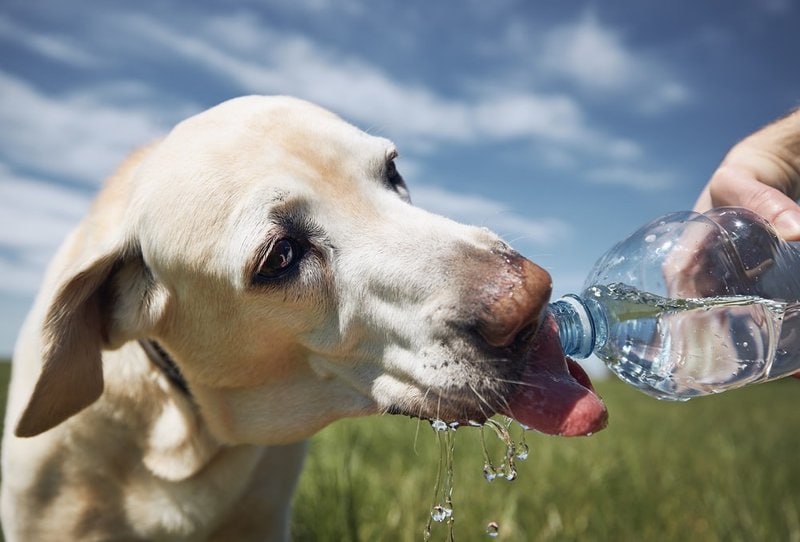There are few things as refreshing and capable of hitting the spot like a cold glass of sparkling water. However, as a dog owner, you may be concerned about whether or not the bubbly, refreshing drink is safe to give your dog.
It is perfectly alright to give your dog some sparkling water from time to time. However, there are a few conditions, including the fact that you have to ensure that you practice moderation in your serving.
Stick around for this and more conditions you have to factor in when it comes to deciding whether or not you should give your dog sparkling water. We shall also take a look at what could happen if your dog takes too much of the bubbly treat.
Finally, you will learn a few situations where it is not a good idea to let your dog slurp up a gulp or two of sparkling water. That way, you don’t end up accidentally putting your dog’s health at risk.
Can Dogs Take Sparkling Water?

It is perfectly alright to let your dog drink sparkling water in moderate amounts. Many dogs actually enjoy the bubbliness of the water and will take it as a nice treat.
What you must understand is that sparkling water does not necessarily offer any health benefits to your dog. It is just fun for your dog as most of them deeply enjoy the bubbly sensation of the carbonated water in their mouths.
It is also important to ensure that a few conditions are met before serving up a bowl of chilled bubbly water to your dog. Here are some of the most important conditions.
The Sparkling Water Should Be Served In Small Amounts
Moderation is key when it comes to serving your dog some sparkling water. It is important to remember that sparkling water will never be as good as regular water. Furthermore, overconsumption of sparkling water could cause persistent vomiting as dogs may not be able to handle the fizziness.
To be safe, avoid giving your dog more than ¼ of your dog’s recommended daily fluid intake. This means that if your dog takes four glasses of water, you should not give them more than one glass of sparkling water in a day.
It is also best to avoid making it an everyday kind of treat. Giving your dog some sparkling water once or twice a week should be more than enough.
The Dog Should Be Otherwise Healthy
Sparkling water should be avoided if your dog is not healthy. It is particularly risky to give it to a dog suffering from gut problems. The carbonated water could cause worsening of the signs and symptoms that your dog is already experiencing.
Furthermore, the effects of sparkling water like bloating could increase the dog’s discomfort. So while sparkling water may be generally safe to give your dog, it is an absolute no-no if your pooch is feeling under the weather.
The Sparkling Water Should Be Free Of Flavor Additives
If the sparkling water has flavor additives of any kind, it is best to avoid giving it to your dog. Artificial sweeteners like xylitol, in particular, are incredibly toxic to dogs and could even cost your pooch their life.
If you must give the dog sparkling water, ensure it is as plain as it gets.
The Sparkling Water Should Not Be A Solution To Extreme Thirst
A thirsty dog is one that does not know how to pace itself. The last thing you want your dog to do is chug their bowl of sparkling water. The carbonation already means that your dog will be gassier than usual.
Giving a thirsty dog sparkling water only increases the amount of bloating they will have to deal with as they are more likely to end up swallowing too much air.
Instead of giving your dog some sparkling water to quench their thirst, leave the bubbly refreshment to be used as a treat every now and then.
What Happens If A Dog Drinks Too Much Sparkling Water?

If your dog consumes too much sparkling water, the biggest issue you have to deal with is the excessive amounts of gas in their stomach. The consequences, in this case, can be as mild as some general discomfort or as severe as deadly bloat.
Bloat is a condition also known as gastric dilatation volvulus. It occurs when the stomach more or less twists on itself when it is full of food, water, or even air.
Some dog breeds are more likely to develop bloat than others. However, it is a valid concern in all dog breeds.
If the twisting is not promptly addressed, the dog’s stomach and intestines may have their blood supply cut off. This causes excruciating pain for the dog and could result in death within a few hours.





